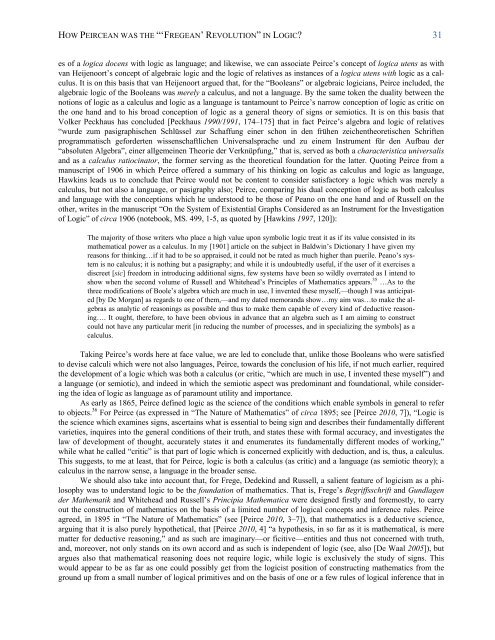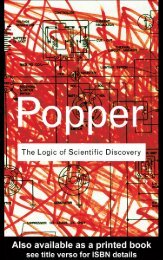You also want an ePaper? Increase the reach of your titles
YUMPU automatically turns print PDFs into web optimized ePapers that Google loves.
HOW PEIRCEAN WAS THE “‘FREGEAN’ REVOLUTION” IN LOGIC? 31<br />
es of a logica docens with logic as language; and likewise, we can associate Peirce’s concept of logica utens as with<br />
van Heijenoort’s concept of algebraic logic and the logic of relatives as instances of a logica utens with logic as a calculus.<br />
It is on this basis that van Heijenoort argued that, for the “Booleans” or algebraic logicians, Peirce included, the<br />
algebraic logic of the Booleans was merely a calculus, and not a language. By the same token the duality between the<br />
notions of logic as a calculus and logic as a language is tantamount to Peirce’s narrow conception of logic as critic on<br />
the one hand and to his broad conception of logic as a general theory of signs or semiotics. It is on this basis that<br />
Volker Peckhaus has concluded [Peckhaus 1990/1991, 174–175] that in fact Peirce’s algebra and logic of relatives<br />
“wurde zum pasigraphischen Schlüssel zur Schaffung einer schon in den frühen zeichentheoretischen Schriften<br />
programmatisch geforderten wissenschaftlichen Universalsprache und zu einem Instrument für den Aufbau der<br />
“absoluten Algebra”, einer allgemeinen Theorie der Verknüpfung,” that is, served as both a characteristica universalis<br />
and as a calculus ratiocinator, the former serving as the theoretical foundation for the latter. Quoting Peirce from a<br />
manuscript of 1906 in which Peirce offered a summary of his thinking on logic as calculus and logic as language,<br />
Hawkins leads us to conclude that Peirce would not be content to consider satisfactory a logic which was merely a<br />
calculus, but not also a language, or pasigraphy also; Peirce, comparing his dual conception of logic as both calculus<br />
and language with the conceptions which he understood to be those of Peano on the one hand and of Russell on the<br />
other, writes in the manuscript “On the System of Existential Graphs Considered as an Instrument for the Investigation<br />
of Logic” of circa 1906 (notebook, MS. 499, 1-5, as quoted by [Hawkins 1997, 120]):<br />
The majority of those writers who place a high value upon symbolic logic treat it as if its value consisted in its<br />
mathematical power as a calculus. In my [1901] article on the subject in Baldwin’s Dictionary I have given my<br />
reasons for thinking…if it had to be so appraised, it could not be rated as much higher than puerile. Peano’s system<br />
is no calculus; it is nothing but a pasigraphy; and while it is undoubtedly useful, if the user of it exercises a<br />
discreet [sic] freedom in introducing additional signs, few systems have been so wildly overrated as I intend to<br />
show when the second volume of Russell and Whitehead’s Principles of Mathematics appears. 35 …As to the<br />
three modifications of Boole’s algebra which are much in use, I invented these myself,—though I was anticipated<br />
[by De Morgan] as regards to one of them,—and my dated memoranda show…my aim was…to make the algebras<br />
as analytic of reasonings as possible and thus to make them capable of every kind of deductive reasoning….<br />
It ought, therefore, to have been obvious in advance that an algebra such as I am aiming to construct<br />
could not have any particular merit [in reducing the number of processes, and in specializing the symbols] as a<br />
calculus.<br />
Taking Peirce’s words here at face value, we are led to conclude that, unlike those Booleans who were satisfied<br />
to devise calculi which were not also languages, Peirce, towards the conclusion of his life, if not much earlier, required<br />
the development of a logic which was both a calculus (or critic, “which are much in use, I invented these myself”) and<br />
a language (or semiotic), and indeed in which the semiotic aspect was predominant and foundational, while considering<br />
the idea of logic as language as of paramount utility and importance.<br />
As early as 1865, Peirce defined logic as the science of the conditions which enable symbols in general to refer<br />
to objects. 36 For Peirce (as expressed in “The Nature of Mathematics” of circa 1895; see [Peirce 2010, 7]), “Logic is<br />
the science which examines signs, ascertains what is essential to being sign and describes their fundamentally different<br />
varieties, inquires into the general conditions of their truth, and states these with formal accuracy, and investigates the<br />
law of development of thought, accurately states it and enumerates its fundamentally different modes of working,”<br />
while what he called “critic” is that part of logic which is concerned explicitly with deduction, and is, thus, a calculus.<br />
This suggests, to me at least, that for Peirce, logic is both a calculus (as critic) and a language (as semiotic theory); a<br />
calculus in the narrow sense, a language in the broader sense.<br />
We should also take into account that, for Frege, Dedekind and Russell, a salient feature of logicism as a philosophy<br />
was to understand logic to be the foundation of mathematics. That is, Frege’s Begriffsschrift and Gundlagen<br />
der Mathematik and Whitehead and Russell’s Principia Mathematica were designed firstly and foremostly, to carry<br />
out the construction of mathematics on the basis of a limited number of logical concepts and inference rules. Peirce<br />
agreed, in 1895 in “The Nature of Mathematics” (see [Peirce 2010, 3–7]), that mathematics is a deductive science,<br />
arguing that it is also purely hypothetical, that [Peirce 2010, 4] “a hypothesis, in so far as it is mathematical, is mere<br />
matter for deductive reasoning,” and as such are imaginary—or ficitive—entities and thus not concerned with truth,<br />
and, moreover, not only stands on its own accord and as such is independent of logic (see, also [De Waal 2005]), but<br />
argues also that mathematical reasoning does not require logic, while logic is exclusively the study of signs. This<br />
would appear to be as far as one could possibly get from the logicist position of constructing mathematics from the<br />
ground up from a small number of logical primitives and on the basis of one or a few rules of logical inference that in





